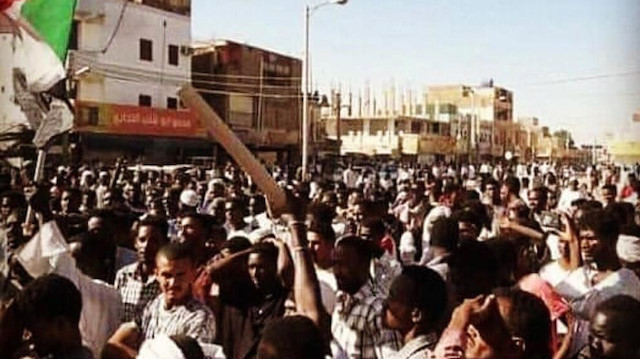
Demonstrations erupt in 13 out of 17 provinces with some protesters calling for overthrow of al-Bashir regime
Sudan has been overwhelmed in recent days by steadily mounting demonstrations in 13 out of 17 provinces across the country.
Protesters decry deteriorating economic conditions and chronic shortages of basic necessities, including bread, fuel and cash -- especially given the recent devaluation of the country’s local currency.
Last week, demonstrations erupted -- for the first time -- in Atbara, a city teeming with laborers, as thousands of students and local residents flooded the streets to condemn rampant inflation and skyrocketing bread prices.
Protests have also spread to other cities, with many demonstrators venting their dissatisfaction with the policies of President Omar al-Bashir, who has remained in power for the last 30 years.
In some areas, government buildings and offices affiliated with al-Bashir’s ruling National Congress Party have been torched.
While official estimates now put the total death toll from the protests -- which in some places have turned violent -- at eight, opposition groups insist that at least 22 people have been killed in the unrest.
Each day, demonstrations have spread to more cities and villages -- to the discomfiture of the regime in Khartoum.
Some observers have noted that demonstrators have gone from merely condemning rising living costs to demanding the departure of the al-Bashir regime.
In an article posted on Facebook, Abdullah Ali Ibrahim, a former presidential candidate, said the protests “may finally offer an exit from Sudan’s long history of [rotation of power through] military coups”.
Sudanese journalist Majid Mohamed Ali told Anadolu Agency that protest organizers “are now the ones determining the country’s political trajectory -- not the government or the opposition”.
“Only a few days ago, Sudan was nothing more than a file on discussion tables in Washington, Paris and Berlin,” he said. “Now it is in the hands of the masses.”
He added: “The Sudanese people can decide their fate better than the government or the opposition parties.”
The presidency and the ruling party, meanwhile, have vowed to stand firm against perceived threats to public order while also resolving the country’s economic crisis “as soon as possible”.
Khartoum has not, however, offered anything else, except to declare its adherence to al-Bashir’s “National Dialogue” initiative, launched in 2014 (which largely failed to attract major opposition parties or rebel groups under its umbrella).
Meanwhile, many Sudanese are voicing skepticism regarding the opposition’s reaction to the mounting protests.
For example, Sadiq al-Mahdi, leader of Sudan’s opposition National Umma Party (and a former prime minister), has been accused by critics of trying to “conclude a settlement with the regime”.
Al-Mahdi, for his part, has declared his rejection of any proposed political deal that would save the current government in Khartoum, insisting his party sought a "new regime".
Speaking at a press conference in the capital, he promised to present the government with a “memorandum”, which, he said, would lay out means of “setting a new presidency for the country".
“We will consult with all the country’s political forces regarding the articles of the memorandum and when to submit it,” he asserted.
"If the government doesn’t respond to the memorandum, we will call for a general strike -- to be followed by a general uprising scenario," he added.
Al-Mahdi has also called for the establishment of a transitional government with a view to avoiding “unnecessary division”.
Other opposition parties, meanwhile, including Sudan’s Communist and Baath parties, have announced their solidarity with the protesters and have called for a general strike to be held on Wednesday.
One of Africa’s longest-serving leaders, al-Bashir has remained in power since assuming the presidency in a 1989 military coup.




